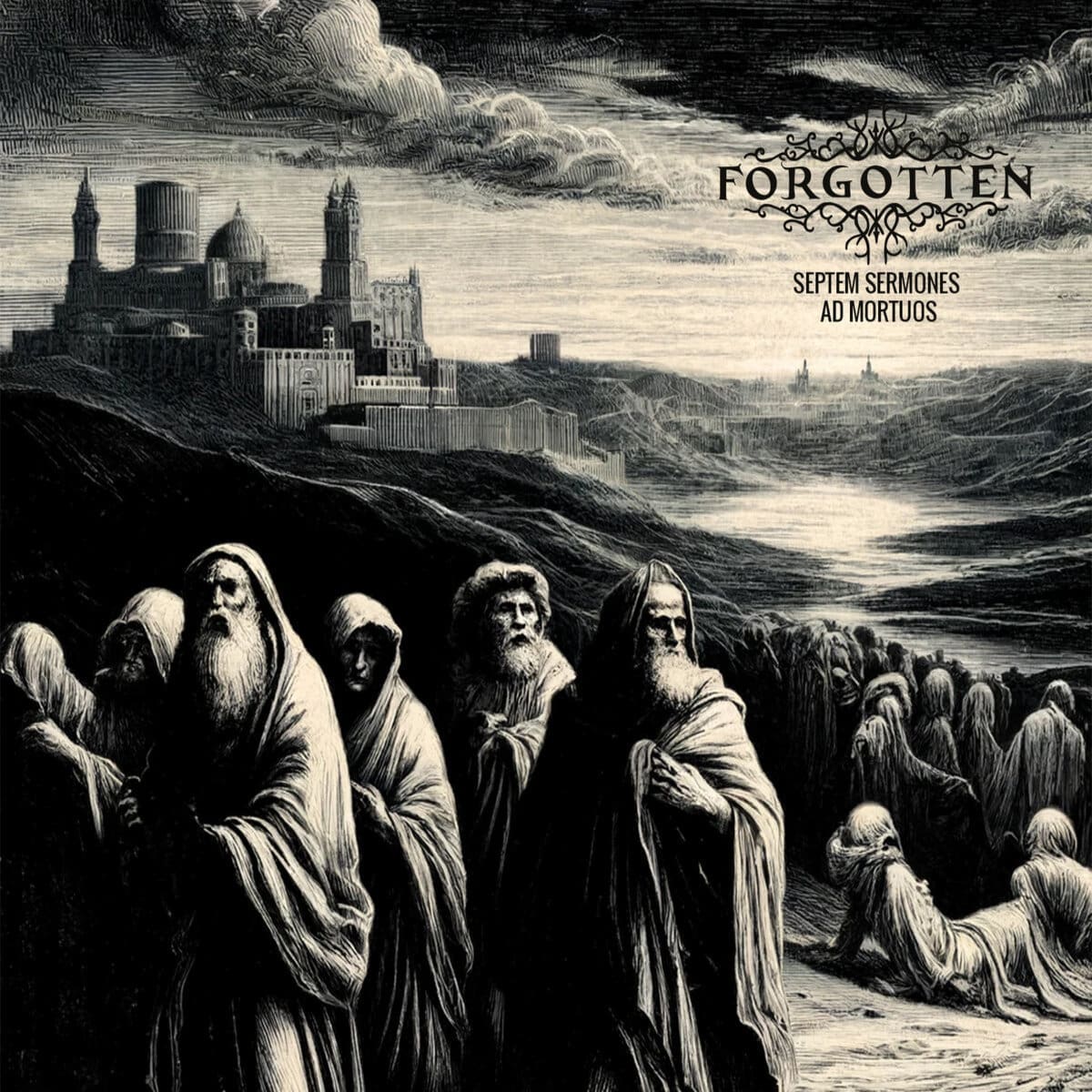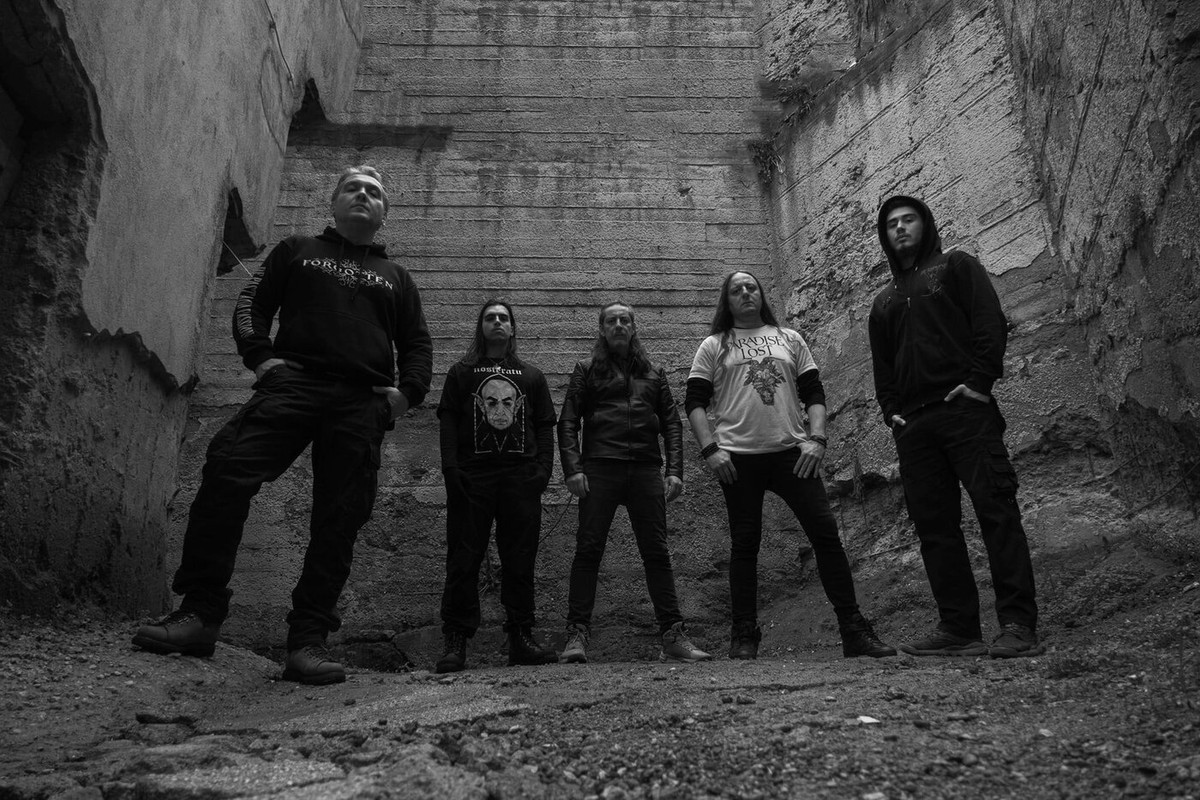Forgotten — Septem Sermones ad Mortuos Review
Forgotten, a Melodic Doom/Death band from Türkiye, returned on July 11th, 2025 with their fourth studio album, Septem Sermones ad Mortuos, released through Sleaszy Rider Records. This is no ordinary release—each track unfolds like a sermon to the dead, guiding the listener through a ritual of introspection and sonic reverence.
Forgotten, Septem Sermones ad Mortuos Review: This review will evaluate every aspect of the album, from its intricate musical composition to its production. Our analysis will provide valuable insights to help you determine if this album is worth adding to your collection.

The First Three Sins, The Summary
The Fourth Sin, Overall Discussion
A Different Turn, A Deeper Rite: Septem Sermones Begins
This review takes a different turn. Septem Sermones ad Mortuos feels more complex. Forgotten challenges listeners more than their Returnless release. So within this review, I will break down each hymn, offer an overall reflection, and explore the final three sins.
Septem Sermones ad Mortuos — Latin for “Seven Sermons to the Dead.” This album continues their evolution from epic battlefield tales to introspective meditations on life and time.
“Nine sermons carved into the bones of time…” “A ritual journey through grief, memory, and cosmic surrender…” “Forgotten returns not with an album, but with a liturgy…”
The dream temple opens: Archetypes stir
Upon the listener pressing play, the introductory hymn commences, Jungian Dreams. This fifteen-minute composition feels like one song broken into seven parts. These parts blend well, creating one flowing passage, some parts repeat, small changes are made. The listener is invited into a vast meditative space. It feels like a descent into the collective unconscious. The mix is huge. Layers are drenched in reverb. Guitar parts with clean arpeggios grow, they become distorted doom waves; tremolo spirals evoke dream logic.
Ambient pads swirl like psychic fog — think archetypes whispering from the void. Spoken word and deep laments trade places. It’s like an ego talking to its shadow. The drums have a tribal beat with a ceremonial pacing. Audio clips may include Jung quotes or fragments of dreams.
The whole hymn is sombre, melodically depressive -yet beautiful and feels like a dream.
A wound exposed: The altar bleeds & astral ruins echo with memory
Proceeding to the second and third hymns. Deprival operates for less than three minutes, whereas Dreamscape endures for over seven minutes.
Deprival feels raw and immediate, like a wound exposed. Sharp, angular riffs attack. Synths offer a minimal, ghostly drone. Harsh growls, almost whispered, speak of ritual loss. The drums hit hard on the snare, there are flashes of fast blast beats.
Dreamscape follows, offering the listener an ethereal and layered, like wandering through astral ruins. Melodic leads with delay effects, weaving dream threads. Synths are strong— shimmering textures and celestial motifs fill the space. Bass and drums offer a melodic counterpoint to guitar, almost lyrical. The drums are mid-tempo, with syncopated fills that make the ground feel like it’s shifting. Clean vocals blend with death growls, showing a mix of dream and decay. Audio clips might be reversed speech. Or they could be sounds from nature.
The ritual falters: Doubt enters and grief drifts across galaxies
Forgotten‘s subsequent piece is a two-minute composition titled Ambivalence, followed with the sixth-minute, fifth piece Bereavement Through the Stars.
Ambivalence is an ambient soundscape instrumental that feels compressed and claustrophobic. Featuring discordant chords, flickering synths, fragmented delivery, unstable pacing.
Bereavement Through the Stars features a recording and sound that feels like a cosmic mourning — expansive and melancholic. This hymn features slow, melodic doom riffs with celestial bends with star-field ambience, echoing grief across galaxies. While the drums are slow and ritualistic — like a funeral procession, adding to this deep feeling are the vocals, clean vocals dominate with sorrowful phrasing.
A beacon in the void
Next is Lodestar, an over thirteen-minute epic centrepiece composition— a guiding light through darkness. Just like the opening piece, this piece unfolds into sections. These parts blend into one. Layered harmonies, soaring solos, and doom-laden rhythm work, orchestral swells and choral pads — celestial navigation. Steady bass riffs anchor the sound. They ground the astral journey. The drums are dynamic — shifting from slow dirge to galloping momentum. Vocals are more chant-like passages, invoking mythic guidance. Again, audio clips, perhaps mythic invocations or readings from a star chart?

A breath between storms & devotion carved in sound
Followed with the over two-minute hymn, Yieldance, and the eighth piece, Orison, an over eight-minute piece.
Yieldance is a clean piano instrumnetal — a moment of surrender — soft and introspective. This piece feels soft and thoughtful. Bass and drums are almost absent — a breath between storms. Only clean, finger picked motifs and gentle synths are present, that are almost sacred tones. With whispered or spoken words are heard — a vow or offering.
Orison leans into progressive metal that merges melodic death metal — a prayer — solemn and reverent.
Slow, melodic doom riffs with harmonic layering, with steady, ceremonial pacing drums. Synths mimic church organs, creating a ritualistic ambiance, the vocals (what feels) Gregorian-style clean vocals mixed with deep growls — dual devotion. Once more, audio clips, possibly liturgical samples or whispered invocations.
Kindness remembered. Tragedy transcended.
Concluding the over twelve-minute composition, The Man with a Kind Heart, presents an emotional apex — warm, tragic, and transcendent. Melodic leads with emotional phrasing, echoing kindness and loss. The synths are rich, cinematic — like memory unfolding. Vocals are clean but dominate, with heartfelt delivery. Bass riffs are supportive, melodic — like a pulse of compassion, while the drums are dynamic, rising, and falling with emotional tides. Lastly, the audio clips, possibly voice recordings or dedications — a eulogy in sound.
A Tapestry of Sins and Sound: Forgotten’s Ceremonial Offering
Overall, Forgotten’s Septem Sermones ad Mortuos, a ceremonial fruit of art — a tapestry of sound stitched with grief, memory, and cosmic devotion. The devilmanship is tight and highly professional. Furthermore, the instrumental composition and arrangement are fresh and complex.
Forgotten’s Septem Sermones ad Mortuos is to savour. Play it with no distractions. Turn off all modern devices. Use headphones, this ensures you hear every detail, and appreciate the devilmanship at work. Simultaneously, do not allow the run-time or the audio clips to deter you; the audio clips are integral to the experience.
The Expedition Concludes
We extend our gratitude to Forgotten for granting us passage into their latest sonic rite. As the echoes of Septem Sermones ad Mortuos fade, we now descend into the final triad of sins—each a closing invocation in this ritual of sound and shadow.
The Fifth Sin, The Memorabilia
Each track, in my opinion, is thoughtfully composed—woven together like verses in a book of poems. The album flows with a quiet inevitability, each piece fitting into the next like a jigsaw of grief and grandeur. The vocals are truly something else: commanding, spectral, and emotionally charged. But it’s the guitar work—especially in the opening hymn—that refuses to leave my mind. Those riffs (through-out, the album) are beautifully haunting, almost hypnotic in their persistence. The solos later on… it streaks across the soundscape like shooting stars: brief, fruit of art, unforgettable.
Each hymn stands apart—distinct in mood, structure, and spirit—yet unified in ritual purpose. This release kept me hooked from start to finish; the repeat button became my closest companion. Not a single track was skipped. Whether through headphones or open air, the experience remained immersive, sacred, and whole.
The Sixth Sin, The Artwork
This isn’t just cover art—it’s a threshold. Forgotten doesn’t invite you to listen; they summon you to witness.
The Seventh Sin, Disrelish
To disrelish Forgotten‘s Septem Sermones ad Mortuos is to commit a sin against sonic devotion itself. This EP is no mere collection of hymns—it’s a ritual offering, steeped in melodic grandeur and shadowed emotion. Thus, we conclude our review of Septem Sermones ad Mortuos. We thank Forgotten for opening the crypt and allowing us to bear witness. May you, dear reader, venture deeper into their discography and uncover more of their sacred craft.
The Hymns
01. Jungian Dreams
02. Deprival
03. Dreamscape
04. Ambivalence
05. Bereavement Through the Stars
06. Lodestar
07. Yiedance
08. Orison
09. The Man With a Kind Heart
Forgotten
Harun Altun — Vocals
Tolga Otabatmaz — Guitars
Emre Örs — Guitars
Burak Karkurum — Bass
Reha Kuldaşlı — Keyboards
Serdar Güzelişler — Drums